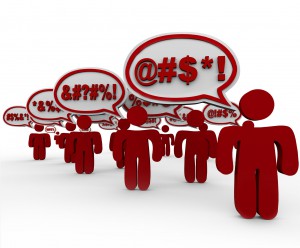It’s that time again, everybody.
The one we’ve all been waiting for.
No, I’m not talking about spring or the start of Major League Baseball.
It’s election season.
Aren’t you excited?
Every four years (or more often, for citizens who never miss a chance to cast a ballot), we partake in what seems like the cherished national pastime of “blame somebody else.”
Whether it’s Democrats blaming Republicans, conservatives blaming liberals, Congress blaming the White House or citizens blaming politicians en masse, everybody at this special time seems to find someone else to blame for our many problems.
Here’s my question: What good does it do to blame other people?
The answer, of course, is nothing.
For this election season, and going forward in our lives, I suggest trying something novel:
Take responsibility yourself.
Look, I know that sounds ridiculous in some situations.
It’s absurd to suggest that you, or any person, is responsible for huge and complicated problems like poverty, unemployment or something as random as the Zika virus.
If you’re stopped at a red light and someone rear-ends you, obviously it’s not your fault.
But I’d like to encourage you to think of this concept not in terms of truth, but in terms
of use.
Forget about figuring out who actually is to blame for something.
Instead, consider whether it’s more valuable to blame someone else or to take responsibility yourself and learn from past mistakes.
When it comes to our own investment behavior, this is particularly valuable advice.
Imagine that Goldman Sachs just predicted a terrible market in the coming year and, based on that forecast, you sold a quarter of your portfolio for a loss.
Immediately after, the market boomed for months.
Did you lose a ton of money? Yes.
Was it Goldman Sachs’ fault?
That’s arguable.
But even if it were, did you learn anything by blaming it on the firm?
If we blame Goldman Sachs for our losses, all we can do is say we got badly misled and hope we don’t get fooled again.
We’re powerless to improve our situation.
But if we instead take responsibility for risky investing or listening to the latest professed market seer, for not sticking to our financial plans or for any other number of things, we have a much better opportunity to minimize the chances of bad things happening to us in the future.
What’s really powerful about this practice is that even when I know I’m not to blame for my situation, I still find it helpful. It sounds really heavy, always taking responsibility.
But I’ve found the opposite to be true.
It feels enlightening and not heavier at all, like a burden has been lifted from my shoulders.
It allows me to let go of feeling helpless and empowers me to come up with creative ways to improve my situation.
This idea reminds me of a quote from Leo Tolstoy, “Everyone thinks about changing the world, but no one thinks of changing himself.”
In the end, that’s the only thing you have control over: yourself!
Even if you could bend Goldman Sachs over your knee and give it a spanking when it messed up a market forecast, odds are that you wouldn’t get the firm to change
its behavior.
What you can do is take responsibility for how you react to that forecast.
In the future, you can make a plan for how to handle the risk, then stick to it.
Think of this not as an indictment but as an invitation.
I’m not here to lay blame on you; I’m here to encourage you to take at least some of the responsibility when things go wrong and then learn from your mistakes.
Ultimately, I think you’ll find that doing so will be more empowering and more productive than blaming someone else.


No comments:
Post a Comment